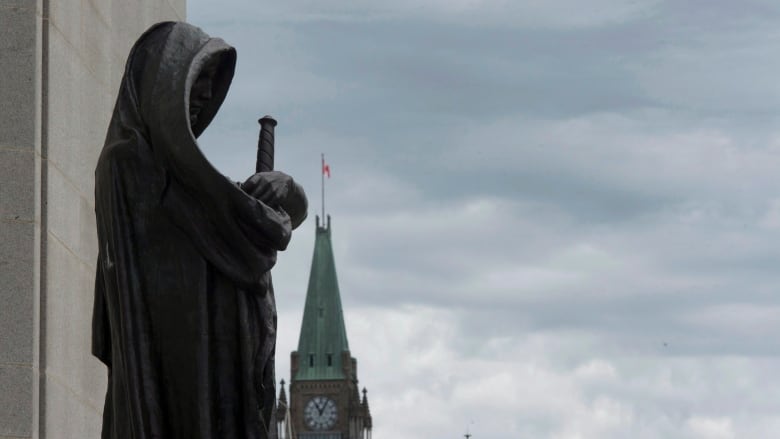Why legalizing medically assisted dying for people with mental illness is misguided
Suicide prevention and MAID facilitation are fundamentally incompatible moral and pragmatic positions

This column is an opinionby Dr. John Maher, an Assertive Community Treatment (ACT) psychiatrist specializing in the treatment of severe mental illness, president of the Ontario Association for ACT & FACT, and editor-in-chief of the Journal of Ethics in Mental Health.For more information about CBC's Opinion section, please see theFAQ.
I am a psychiatrist, and over the past couple of years I have had suicidal patients ask me for medical assistance in dying (MAID). I have explained this is not an option, because they are not dying (their death is not "reasonably foreseeable")and Canadian law does not allow MAID for people living with mental illness.
But now, with the Quebec court's Truchon decision, it looks like everything is about to change. And I am appalled at the unfairness.
Under the specious guise of legal equality of access to a so-called medical act, Canadian legislators are considering the use of doctors as surrogates to end the lives of our fellow citizens who suffer from treatable mental illness.
A few days ago, a 30-year-old patient with very treatable mental illness asked me to end her life. Her distraught parents came to the appointment with her because they were afraid that I might support her request and that they would be helpless to do anything about it. It's horrific they have to worry that by going to a psychiatrist, their daughter might be killed by that very psychiatrist.
That same patient said to me, "a doctor killing me is not suicide, it is totally different."
The perverse veneer of moral acceptability that follows from medicalizing what is patently not a medical act is infuriating in its obfuscatory power. This facile reasoning, from "this person's suffering persists" to the claim that "death is the best relief of suffering," betrays profound ignorance about all of the pathways and varied means possible for the relief of suffering.

I have been specializing in treatment-resistant mental illness for 17 years. I want to scream from the political and juridical mountaintop that "treatment resistant" does not mean untreatable. It means clinical experience and sophistication are needed; it means that specialized tertiary care programs are needed; it means patience and persistence are needed.
And in reality, it means that every single person with severe mental illness can experience dramatic improvement in their symptoms and concomitant reductions in their suffering.
The law currently requires that to be eligible for MAID, a patient must meet the standard of "grievous and irremediable" suffering. I have seen much grievous suffering that I acknowledge took months to several years to ameliorate, but I have yet to see a patient with irremediable suffering unless left untreated by inadequate availability of services.
- If you're experiencing suicidal thoughts or having a mental health crisis,help is available across Canada.For an emergency or crisis situation, call 911.
If you have done this work for a long time, it becomes very clear that the main reason for wanting to die is desperate loneliness and existential hopelessness. Shared suffering is reduced suffering. But why live if no one will help me? Why live if my country says my doctor will end my lifeif I ask?

When I hear patients (as I often do) say nothing works and then I discover they have not been referred to, or had access to, the right specialized care, I cringe. If you have a hard-to-treat cancer you go to the oncology subspecialist. If you have a brain tumour you get a fast referral to a neurosurgeon. If you have a brain disease like schizophrenia, however, you can wait years to get the right care.
In Ontario we have two- to five-year waits for some subspecialist/tertiary-level mental health care; this translates into tens of thousands of people (your mom, your partner, your child) left to wallow in their suffering. They are voiceless.
Meanwhile, those who are not voiceless lawyers, politicians, suicide advocacy groups - are good at shouting and oversimplifying the real issue, all under the guise of protecting rights: "You deserve to have the right to get your doctor to kill you."
Unfortunately, you do not seem to deserve the right to have the treatment or support that decades of evidence shows can help.
Whither TMS, ACT, community care teams, enough mental health beds, youth mental health services, widely available psychotherapy, and on and on And against the naysayers who protest that none of this is affordable, I point to the decades of economic research that shows again and again that prevention and implementation of the right services doesn't cost more it saves billions.

This is about political blindness.
We would never underfund heart disease, cancer, and myriad other diseases the way we do mental health care. This is widespread and systematic stigmatization bolstered by prejudice and ignorance. Politicians won't fund the mental health services we know work, but they're considering paying doctors to end the lives of their patients patients who don't even know that they have been systematically denied access to treatment that would help.
If society won't pay for the timely access to effective treatments, then society must not make me its surrogate killer. My vocation, training and oath all aim to relieve suffering and help people find meaning and purpose.
We can't have it both ways: suicide prevention and facilitation are fundamentally incompatible moral and pragmatic positions.- Dr. John Maher
Holding a gun to your head, sticking a needle in your arm, or holding a poison pill and a glass of water in my hands for you to take, are all morally equivalent actions. And don't tell me your desire to die changes the moral nature of my complicity. Your desire to die should call forth in me all possible action and means to keep you alive.
Such have been the laws that require me to admit you into a hospital for your own safety. We can't have it both ways: suicide prevention and facilitation are fundamentally incompatible moral and pragmatic positions.
And any proposed "safeguards" against abuse in Canada will falter. The past 15 years in Belgium and The Netherlands have shown us that some psychiatrists will ignore safeguards, and some prosecutors and courts won't enforce them.
Disturbingly, a small number of psychiatrists have done an inordinate proportion of the direct killing of mentally ill patients in these countries. Without question, some psychiatrists in Canada will also be willing to end the lives of their patients. Word will quickly get out about which psychiatrists you should go to in order to get the job done.
The legal language used in Canada also undermines any likelihood of effective safeguards. The standard of "grievous and irremediable" suffering is subjective and cannot be made objective, and every patient in Canada is free to refuse any treatment no matter how much it might help.
In short, I can make myself meet the criteria, and I will find a psychiatrist who will confirm my capacity to choose death and go along with my request to end my life. The only possible way to stop these inevitable abuses is to ban the practice of medically assisted dying for all persons living with mental illness.
Fellow psychiatrists, please hold fast against being pressured to do what we swore we wouldn't.And please step up, parliamentarians! Step up, ministers of health! Step up, premiers! Step up, prime minister!
And should it ever come to it, please know that I will never support you in your belief that your life is not worth living.
- This column is part of CBC's Opinion section. For more information about this section, please read ourFAQ.












_(720p).jpg)


 OFFICIAL HD MUSIC VIDEO.jpg)
.jpg)



























































































